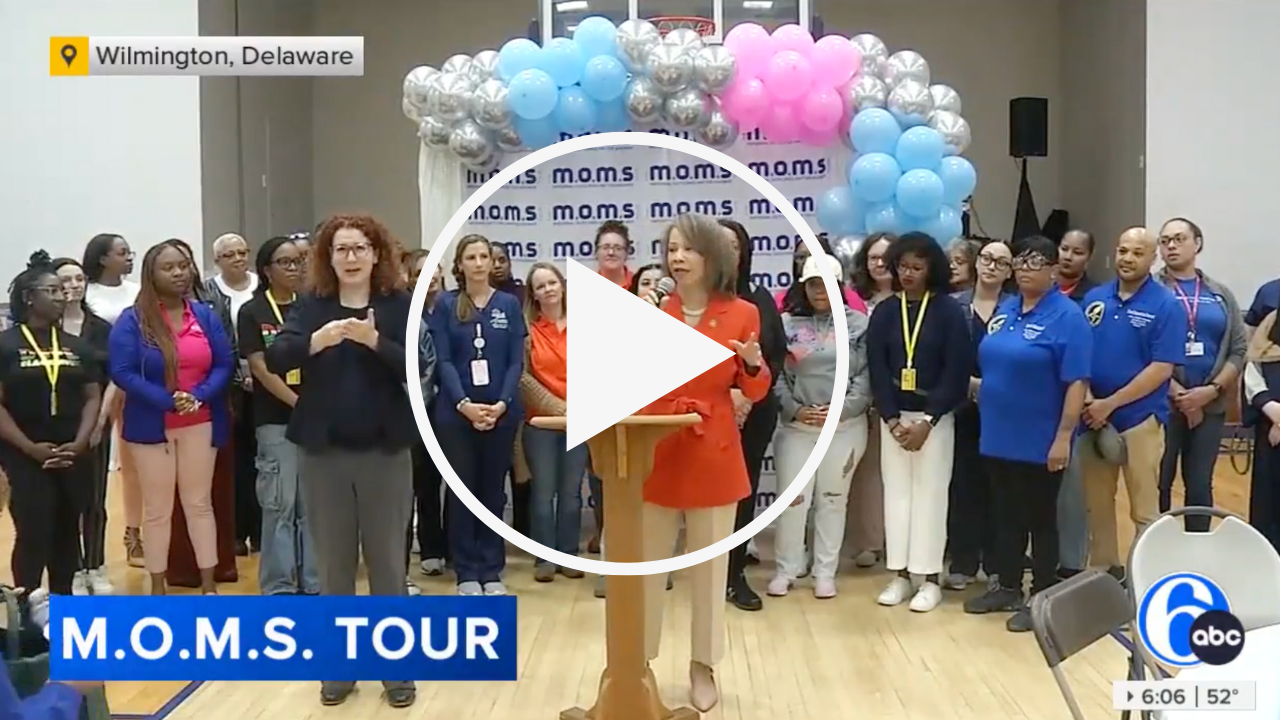ICYMI: Rep. Blunt Rochester Highlights Investments for Children, Resources for Seniors, and Maternal Health in Delaware
Washington,
May 9, 2024
|
Victoria Panzera
(302-753-7684)
In case you missed it, last week, Rep. Lisa Blunt Rochester (D-Del.) highlighted investments for children, resources for seniors, and maternal health in Delaware. Blunt Rochester hosted Deputy Secretary of Agriculture Xochitl Torres Small at Lewes Elementary School to highlight critical investments in increasing healthy food options for children in Delaware. Blunt Rochester and Torres Small also stopped by Blunt Rochester’s Senior Constituent Resource Fair at the Lewes Senior Activity Center. This was the second resource fair the Congresswoman has hosted, and over 20 federal and state agencies and local organizations were in attendance to assist seniors in Delaware. Additionally, Blunt Rochester joined the U.S. Department of Health and Human Services for the M.O.M.S. (Maternal Outcomes Matter Shower) Tour in Wilmington, a community baby shower that connects moms and their families with community organizations and resources in areas with high maternal mortality rates.
Read or watch more about these community-focused events in WBOC, 6abc, WRDE, and Delaware Public Media.
WRDE: Lewes Elementary School students harvest garden for school lunch hero day Author: Zakiya Jennings Students, teachers and district administrators gathered Friday at Lewes Elementary School to celebrate School Lunch Hero Day. Along with U.S. Department of Agriculture Deputy Secretary Xochitl Torres Small and U.S. Rep. Lisa Blunt Rochester, the group participated in a garden harvest. "My favorite part is getting to go out there daily with a little bowl and collect the strawberries," said Joseph Bradshaw, a fifth grader at Lewes Elementary School. The harvest was in partnership with Healthy Foods for Healthy Kids and aligns with a USDA update on nutrition standards for school meals. The update is a step toward advancing the Biden-Harris administration's national strategy to end hunger and reduce diet-related disease by 2030. This initiative was set in stone at the White House Conference on Hunger, Nutrition and Health in September 2022. One of the major nutrition updates will be including less sugar in school lunches, which is set to begin during the fall in 2025. These changes come after listening to public feedback and taking the latest science-based recommendations from the Dietary Guideline for Americans into consideration. "Like teachers, classrooms, books, and computers, nutritious school meals are an essential part of the school environment, and when we raise the bar for school meals, it empowers our kids to achieve greater success inside and outside the classroom," said Agriculture Secretary Tom Vilsack. Expected changes include limited added sugars in breakfast items and flavored milk, and slightly reduced sodium content in the meals. Starting this fall, the goal is to make it easier for schools to serve protein-rich breakfast foods such as yogurts, tofu, eggs, nuts, and seeds, though it is not a new requirement. Schools will also have the option to require unprocessed agricultural products to be locally grown, raised, or caught when making purchases for school meal programs. Schools will continue to emphasize fruits and vegetables, ensuring kids have the right balance of many nutrients for healthy and tasty meals.
Author: Sarah Petrowich Delaware’s Healthy Foods for Healthy Kids (HFHK) celebrates School Lunch Hero Day after being awarded a USDA grant to expand programming. Congresswoman Lisa Blunt Rochester and U.S. Deputy Secretary of Agriculture Xochitl Torres Small visited Lewes Elementary School Friday to see the success of Delaware’s HFHK program. HFHK is a Delaware non-profit that is currently partnered with 30% — around 52 — of the state’s public elementary schools to help implement an Education Cultivation Program. The initiative helps schools build their own gardens in which students are the hands-on cultivators, providing school nutrition services with vegetables they can use in student meals. Each grade level has their own designated part in the process, with kindergartners and first graders planting the seeds all the way up to the fourth and fifth graders, who harvest the produce. “In most of our schools, we partner with nutrition services that then the students take the vegetables to nutrition services that prepares them for the entire student body to enjoy in the cafeteria the next day," says HFHK Executive Director Lydia Sarson. She explains the program aims to bridge the gap between what students are learning in science classes and where they believe their food comes from. "Every student has a special job that fits with Next Generation Science Standards. The garden program is broken up that way — more hands make a little bit lighter work too because there's a lot that goes into a garden," Sarson adds. Nutrition service specialists say preparing the harvested vegetables can lead to extra work and late nights, but they don’t mind the additional workload when it provides better nutrition and education for students. Blunt Rochester notes according to national non-profit organization Feeding America, 1 in 7 Delaware children face hunger, and she commends the programs intentions, as well as the nutrition service specialists who help execute it. “Sometimes the school meal is the only substantial meal a child may have, and so to be able to make sure that it's healthy, and then to also include them in the education of where your food comes from – that lettuce doesn't come from a bag, that it comes from the ground," she says. HFHK received a $97,000 USDA grant in 2023 that helped the nonprofit put on their first Garden Coordinator workshop for staff professional development and they added three new partner schools in 2024. Torres Small says she's seen other success stories like HFHK across the nation. "What's so exciting about the Specialty Crop Block Grant Program is that it provides funding to states that then identifies best ways to support nonprofit organizations and others to get schools connected to healthy food and experience the joy of growing that healthy food." Sarson says she's received requests to expand HFHK into New Jersey, Maryland and Pennsylvania, but she's focused on putting Education Cultivation Programs in all Delaware public elementary schools first. "The only thing that's keeping us back from that now [are] the traditional nonprofit issues of staffing and funding," she says. Blunt Rochester and Torres Small both noted Delaware is now participating in the Summer EBT program for Children, which provides $30 per month per child in grocery-buying benefits for low-income families. The Delaware General Assembly is also considering a bill that would require all public schools to offer students who qualify for a reduced-price meal, under the federal School Breakfast Program and National School Lunch Program, a free breakfast and lunch every school day. ### |







